Dos Voces, Un Destino: Don Vic
En El Salvador el DÃa de Los Padres se celebra el 17 de Junio. Le contamos la historia de nuestro padre en su honor.
Victorino Rodezno nació en 1920, hijo de Pedro Rodezno y Isabel Callejas de Rodezno. Ellos vivÃan en Tamanique, un pueblito como 20 kilometres de la costa en las montañas de El Salvador. La familia Rodezno tiene raÃces ondas en el pueblito. La familia tenÃa potreros, fincas, una tiendita, y la cantina del pueblo.
Papá era el hijo mayor. Él se crio durante el tiempo de la gran depresión. Tiempo de muchas dificultades económicas. Aunque la Familia Rodezno no eran pobres, la familia siempre acido trabajadora. Trabajando los terrenos y la tienda. Papá cuenta historias de mi abuelito, “El Viejito,” Papá Pedro. Papá Pedro era conocido por ser con mucha compasión. “Al viejito lo buscaban que fuera a curar la gente. Lo buscaban como médico.” Papá discutÃa con su padre porque Papá Pedro era mujerÃo y alcolico. Tomaba mucho; murió por el alcohol. Papá le tenÃa mucho respeto y cariño a su mamá, “Chavelita.” Mamá Chávela manejaba todo el negocio de la familia, cuidando ganado y atendiendo la tienda.
Cuando papá era jovencito, estaba ayudando a sacar el bálsamo. El mecanismo se desprendió y le dio en la cabeza, quebrando la. Todos pensaron que papá iba a morir pero el sobrevivió. Papá todavÃa tiene la cabeza sumida donde se quebró el cráneo.
En 1942 papá se vino a Los Estados Unidos a buscar trabajo con un hermano, Herminio. En esos tiempos, por la guerra mundial, Los Estados Unidos necesitaba que hombres vinieran a trabajar. A llegar a San Francisco papá rápido consiguió trabajo en los muelles limpiando los barcos. Poco después papá se metió a marinero, viajando el mundo entero. En uno de estos viajes papá se enfermó. El capitán tomo la decisión de tomar puerto en la India y internaron a papá en un hospital en Bombay. El barco regreso al mar, sin él. Papá vivió en la India por 10 años, casado con una hindú. Durante el tiempo que el vivió en la India perdió contacto con su familia. Ellos pensaron que el habÃa muerto. Cuando papá regreso a El Salvador lo celebraron. El Diario corrió su historia en la primera página. Una señora me contó que habÃa un desfile como si fuera héroe. El pueblito le tenÃa mucho carriño. La historia que me conto me emocionó tanto que me trajo lagrimas a los ojos. Papá se divorció de su esposa India. Muchos años después cuando herramos niños, papá nos llevaba al zoológico y les hablaba a los elefantes. Él les pedÃa que se sentaran y levantara sus patas de adelante, impresionándonos.
Papá conoció a mamá en una fiesta del pueblo donde ella vivÃa. Mamá cuenta que cuando papá la vio, le dijo a su amigo, “Me voy a casar con esa mujer.” Y asà se cumplió.
Mamá y papá se vinieron para Los Estados Unidos en el año 1959, Papá trabajo en una laundry, la aéreo lÃneas, y por una compañÃa de refrigeración donde se retiró. Nuestra niñez fue completada en una sola casa, en Sur San Francisco que compraron por $19,000.00 en 1963.
Papá nos ha dejado con un valor muy importante. El valor de estar allà para la familia. En nuestra casa mamá y papá siempre le ayudaban a familia recién llegados a Los Estados Unidos. Lo generosos que eran no se les ha olvidado a los que ayudaron. Papá tiene una cárstica de ser callado y reservado, pero cuando habla, habla la verdad. Una prima cuenta que papá respondido por ella cuando su padre era abusivo. Papá le dejo una impresión muy fuerte de todo corazón. En un acto de cariño papa le compro su primera cartera. Algo que ella como una mujer joven aprecio mucho. Tanto que para la celebración de 90 años para papá nos dio una carta con la historia. Algo muy lindo.
La relación de mi papá y mi hermana, Silvia, es muy complicada. Mi papá es su padrastro. Ellos no se llevaron bien hasta que mi hermana tuvo su primera hija, Melissa, y quedo como mamá soltera. Mi papá salÃa en su caminata a ayudarle moverse de apartamento.
La tragedia más grande de nuestra familia fue la muerte de nuestro hermano, VÃctor. VÃctor era gay. Papá nunca pudo aceptar esto, por la cultura del machismo. A un, VÃctor y su compañero tenÃan la puerta abierta de la casa pero cuando la familia preguntaban que quien era el que andaba con VÃctor decÃan que era un amigo. Algo que le causo mucho dolor a nuestro hermano. Cuando VÃctor tenÃa cáncer, mamá y papá vinieron a cuidarlo, en la casa de él y su compañero. Una impresión que no se nos quita es de cuando VÃctor murió. Mamá lo abrazo en sus brazos, llorando y pidiéndole a papá que hiciera algo. Como la estatua de la Virgen Maria en la Piedad Del Vaticano Pieta de Michelangelo. Papá se sentó como desinflado. La angustia en su cara. Era la primera vez que vimos a papá llorar.
Papá siempre fue un hombre fuerte. La segunda tragedia de la familia es la enfermedad de mamá, Alzheimer’s. Aunque el cuerpo de papá está cansado su mente esta alerta. La última vez que fuimos a El Salvador él le dio gracias a nuestras tÃas por cuidarle a su “enfermita.” Ellas lloraron. La enfermedad de mamá le quita vida a papá. Hay dÃas donde ella no lo deja dormir y él se pone mal. Pero cuando los separamos no pueden dormir solos. Me recuerdo lo que papá le dijo al sacerdote, “Ella es el gran amor de mi vida.”
Papá nos deja con el entendimiento de la importancia de ser generoso, tener gratitud, y la importancia de la familia. Siempre vamos a apreciar su humor y espirito de aventura.
Two Voices, One Destiny: Don Vic
In El Salvador Father’s Day is celebrated on the 17 of June. In honor of our father this month’s blog post will be our father’s story.
Dad has led an interesting life. A life of travel, adventure and great tragedy. Victorino Rodezno was born in 1920 to Pedro Rodezno and Isabel Callejas de Rodezno. They lived in a quaint town named Tamanique, in the mountain region, 20 kilometers from the Salvadorian Coastline. The Rodezno family has deep roots in Tamanique. The family held agricultural lands, a general store and the town bar.
Dad was the eldest child growing up during difficult economic times; the great depression. Although the Rodezno family had means, they were a working class family. They worked their lands and store. Dad shares stories of his father that portray a man living in two worlds. “El viejito,” the old man, as my father refers to my grandfather was on one hand a compassionate humanitarian, helping those who fell sick and was often sought out as a medic. He was also a womanizer, with several children out of wedlock and an alcoholic. My father shares stories of his arguments with his father over his drinking and disrespect for his mother. Dad held a deep respect and admiration for his mother, “Chavelita.” Mama Chavela ran the entire family business, especially as my grandfather’s alcoholism progressed into waking up with a drink in his hand.
When dad was a young man he was helping collect balsam; El Salvador is renowned for its balsam groves. At the time, balsam was wrung out using a large wooden press, which was tightened by men. Envision a pony ride, where the ponies are harnessed in a circle and go round and round. The press works in a similar manner, with men walking in a circle making it tighter and tighter. One day when my father was out helping the press was released and as it unwound, it hit him in the head cracking his skull. The family thought they were going to lose him, but he pulled through. To date you can see a concave on the side of his head.
In 1942, dad and his half-brother, Herminio, decided to come to the U.S. The war had led to a labor shortage in the States creating a need for “male” labor. They took buses and trains in order to make the trip from El Salvador to San Francisco. When arriving in San Francisco, they immediately found work in the ship yards. Dad joined the Merchant Marines traveling the world. Once, while out at sea, he became very ill and the captain made the decision to come into port in India. As the story goes, my father was hospitalized; the ship could not remain at port and continued on its journey, leaving him in India. My father lived in India for about 10 years marrying an Indian woman, who he later divorced. During this period, Dad lost total communication with his family and they presumed him dead. Dad eventually returned to El Salvador, where he was greeted with a celebration by the town. I was told by a woman who was there that Dad was celebrated as a hero. The town loved him. Hearing this brought tears to my eyes. Dad’s return made front page news in the country’s major newspaper. Years later, when we were children, we thought dad was magic. When we would frequent the San Francisco Zoo, Dad would speak to the elephants, commanding them to sit and raise their front legs. – commands he learned during his time in India.
My father met mom when he attended a village fiesta taking place in mom’s hometown. Mom says that when my dad saw her, he confided to his friend saying, “I’m going to marry that woman.” He did.
Mom and Dad came to the States in 1959, moving to San Francisco in the early 1960s. Dad worked for a laundry, the airlines and eventually Hussmann Refrigeration, where he retired. We lived our whole childhood in the same home, a Cape Cod style home they purchased in 1963 in South San Francisco for $19,000.
A value we’ve learned from my father has been the importance of being there for your family. Our parents were always helping other family members newly arriving to the States; aunts, uncles, cousins and close friends from the homeland lived with us from time to time. Their generosity was never forgotten. Dad has a characteristic of being quiet and reserved; when he speaks, people listen. He speaks the truth and will stick up for what he believes is right. Dad once stood up for a cousin with an abusive father; leaving an impression on a young vulnerable woman. Dad bought her her first purse; an act of kindness at a time when she needed it. Years later, for dad’s 90th birthday, she shared the special place dad held in her heart.
Dad and Silvia had a strained relationship; Silvia is his step daughter. This changed for them when Silvia had her first child, Melissa. Dad’s compassionate side rose when Silvia found herself a single parent struggling to find housing. I recall dad taking the station wagon to move furniture in or out of apartments.
The greatest tragedy for our family had been the loss of Victor, our brother, due to cancer. Victor was gay. My father struggled with accepting this due to his machismo values. Although Victor and his partners were never shunned away, my father and mother could never bring themselves to tell other family members of Victor’s sexual preference. Victor’s partners were explained as roommates, an action which hurt my brother. This was a decision they would later regret. When Victor got cancer, my parents came to care for him. They went to the home he shared with his partner and watched over him. When Victor died, a memory which never escapes us is of mom cradling him in her arms. She looked like the statute of the Virgin Mary in the Chapel of the Pieta by Michelangelo. She had my brother in her arms, pleading with my father to do something. My father took a seat dejected. An expression of pure helplessness overcame his face. It was the first time I saw my father cry.
My father has always been a strong man. The second tragedy in our family life has been Alzheimer’s disease affecting my mother. His body is frail but he is aware. The last time we went to El Salvador he thanked my aunts for being there to care for his “little sick one.” They cried. The progression of Mom’s disease has contributed to the deterioration in my father’s health. There are days she doesn’t let him rest; yet when we tried to separate them, they couldn’t sleep without one another. As my father told the deacon of our local church, “She is the love of my life.”
My father leaves a legacy of compassion, benevolence, and the importance of family. We will cherish his sense of humor and spirit of adventure.





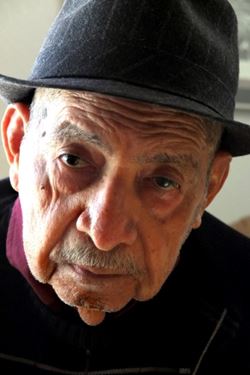
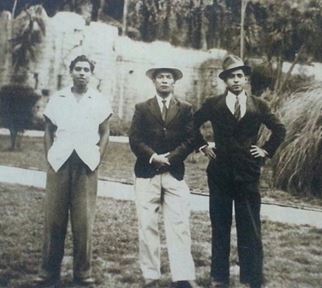
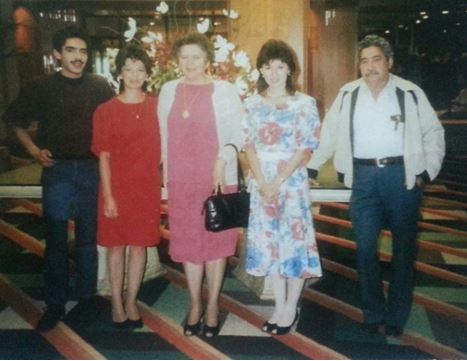
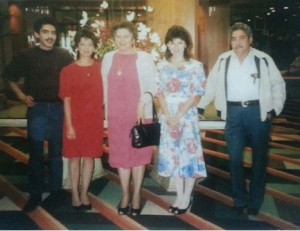

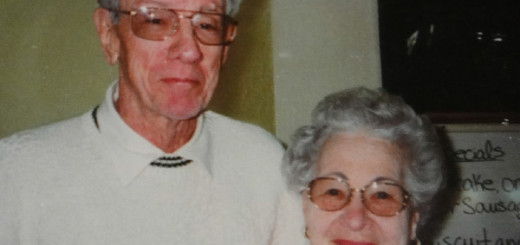
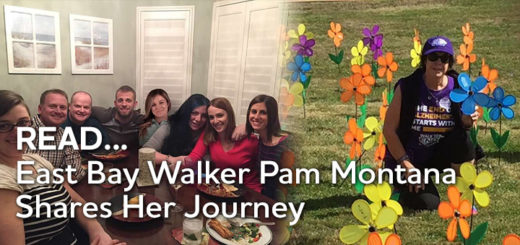










Bonita e interesante historia, tÃo Peter como le decÃan, lo conocà en Chultiopán, creo que fue cuando tió Jorge Erazo murió. Mi madre se llama Alis Rodezno, hija de papa Joaquin, hermano de tÃo Pedro, mi tÃo abuelo.
Gran parte de esta historia, ya la conocÃa; pues, mi madre la contó muchas veces. Asà que, me siento familiarizado con: Dos Voces un Destino.